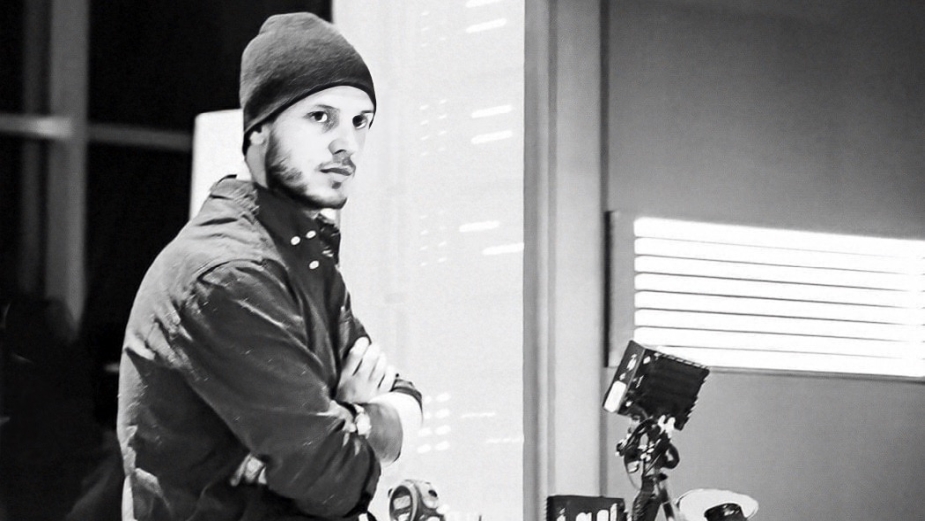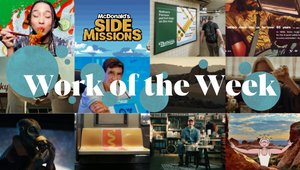
Now Is the Time for Risky Filmmaking in Uncharted Territory

Filmmaker Lucas Shannon blends his quirky comedy and experimental approach to craft across short films, music videos and commercial projects – perhaps most notably in Movistar and VML Mexico’s Cannes Lion-winning ‘This Is Not A Game’.
Now on the roster at global production company LANDIA, Lucas has already had a varied career, having started out as a creative at Publicis agency, the community. But to truly get to the start, we have to go back to 1987.
“My grandma took me to see [Japanese comedy] ‘The Adventures of Chatran’, and it blew my mind,” he says. “Later, I got my dad’s old Panasonic VHS camera and started shooting weird stuff at home. Advertising came later — thanks to those ‘Directors Label’ DVDs featuring Spike Jonze, [Michel] Gondry, and [Jonathan] Glazer. Game-changer!”
Lucas’ route via an agency then ‘gave him a backstage pass to the whole process’, revealing how ideas are built, pitched and sold. “I discovered new directors and ad culture, and learned to embrace the weird. That experience taught me how to collaborate and take creative risks without fear.”

This fearlessness carried over to Lucas’ directorial ambitions, as he chases “anything that feels like uncharted territory”. He explains, “If there’s risk — even the chance of failure — I’m in. I love that Jacques Fresco quote: ‘Creativity is taking known elements and putting them together in unique ways’. That’s the goal.”
This combination of ‘risk, boldness and emotion’ is especially important in Lucas’ commercial work, where he says, “If it doesn’t stick, it’s just noise.” He continues, “People want more than product demos, they want to laugh, feel something, be surprised. Now’s the time for ideas that cut through and actually matter.”
Working with brands, he gets to put his agency background to use, knowing exactly what to look out for in creative discussions, and how to navigate the various stakeholders. “I listen — especially to the fears,” he says. “Then I remind the team why we’re here: to create, to take risks, to make something different. More than shaping the vision, a director’s job is to re-spark that sense of bold, contagious wonder.”
Lucas’ bold approach made headlines in 2024 with ‘This Is Not A Game’, the aforementioned film created for Movistar with VML Mexico. The ambitious project replicated the cinematography and visual language of a third-person RPG videogame a la ‘Grand Theft Auto’, raising awareness of gangs recruiting children through online gaming. The campaign subsequently received awards at Cannes Lions and the Clio Awards, and a Commendation at The Immortal Awards 2024 – not to mention earning Lucas the individual recognition of Best Director of Argentina at El Ojo de Iberoamérica.
Above: 'This Is Not a Game' - Movistar
“It was risky, strange, and totally worth it,” he reflects, describing the difficulty of styling the film and training actors to behave like video game characters. “We had just two shoot days… That meant two takes per shot, max. Preparation saved us — from NPC [non-playable-character] actor training to picking locations that felt grounded but game-like. Every choice had to count.”
The success and international coverage of the project has since brought Lucas exposure, “but the industry’s shaky,” he says. “Even a Gold Lion doesn’t guarantee the next gig. Each job feels like starting fresh. I try to keep the same sense of wonder I had the first time I picked up a camera.”
That being said, the world of production has evolved dramatically since those halcyon VHS camcorder days. And while an advocate for the traditional craft of filmmaking, Lucas is keen to not be left behind.
“I’m writing between shoots and exploring how AI can help sharpen ideas, especially on screenplays,” he says. “Even though I shoot using virtual production and new technologies, I utilise AI more as a creative partner than a VFX tool — for brainstorming, storyboarding, and shaping ideas.
“I still prefer being on set, feeding off real people and moments,” he adds. “AI often feels too polished. I think audiences still crave the human touch — maybe even more now. [But] if image-making becomes easier [via AI], the real challenge will be: what do we tell stories about? Like they say, ‘Learning to make films is easy. Knowing what to make films about is hard.”















